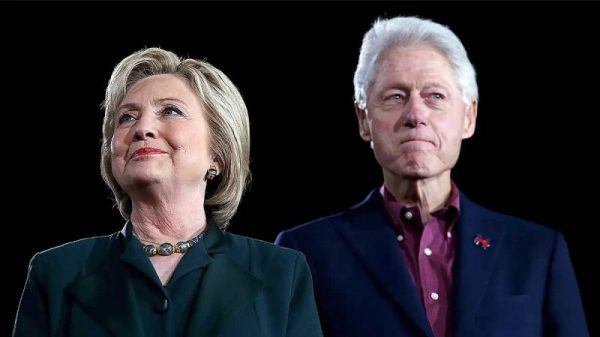Sandra Day O’Connor was remembered Monday for “cowgirl grit” and her pivotal role on the Supreme Court as her family, the public and colleagues honored the first woman to serve on the nation’s highest court.
“The way Sandra went, the court followed,” said Justice Sonia Sotomayor, who spoke on behalf of the court as O’Connor’s flag-draped casket was brought into the court’s Great Hall, where she is lying in repose.
Sotomayor, the third woman nominated to the court, said the trailblazer would be pleased that “four sisters” now serve on the nine-member court. “Sandra, may you rest in peace,” Sotomayor said, her voice breaking.
Sotomayor spoke during a private ceremony that took place before the public entered the court to pay their respects to the justice, who died Dec. 1 at age 93. Nominated by President Ronald Reagan, she served on the Supreme Court from 1981 until her retirement in 2006.
J.P. Hogan, a local blogger and poet, was first in line at the court. Hogan said he remembered being in high school when O’Connor became the first female justice. His father, a lawyer from Connecticut, was sworn in as an officer of the court years later.
“It’s a historic event,” Hogan said of O’Connor’s repose.
The casket carrying the justice from Arizona arrived outside the Supreme Court shortly before 9:30 a.m. About 80 of O’Connor’s former clerks lined up in two columns along the steps of the court in dark suits and dresses as white-gloved Supreme Court police officers and O’Connor’s grandchildren solemnly took the flag-draped casket into the building.
Pallbearers rested O’Connor’s casket on the Lincoln Catafalque, the simple pine-board bier constructed to support the casket of Abraham Lincoln in 1865. Since 1873, it has been used for Supreme Court justices, former presidents and others, including Thurgood Marshall in 1993, John McCain in 2018 and Ruth Bader Ginsburg in 2020.
During her time on the court, O’Connor became known for her independence among the ideologically divided justices, making her a key vote in several cases involving issues such as abortion and race-conscious university admissions.
“The nation was well-served,” Sotomayor said, “by the steady hand and intellect of a justice who never lost sight of how the law affected ordinary people.”
Sotomayor remembered that O’Connor often remarked that she didn’t mind being the first woman on the court, but she didn’t want to be the last. “Sandra was a living example that women could take on any challenge, could more than hold their own in spaces dominated by men and could do so with grace.”
For as long as Heather Maher, 42, could remember, O’Connor was her “hero.” The justice was appointed the year Maher was born. When Maher was in kindergarten, she was determined to be a Supreme Court justice like O’Connor, she said.
Maher, from Rhode Island, said that when O’Connor became sick, she vowed to travel to D.C. to pay her respects. “I’ve admired the path she laid and the bridges she made for other women to follow behind her,” Maher said. “She’s a testament of resiliency.”
Though Maher didn’t become a lawyer, she is a business owner in a male-dominated field, she said.
“She always talked about being visible as a woman in a position of power. … That’s her legacy,” Maher said of O’Connor.
Before being appointed, O’Connor served as assistant attorney general of Arizona, in the state Senate, as a superior court judge and on the state court of appeals. Post-retirement, she founded iCivics, which focuses on furthering civic education, something Maher noted as part of what she admired about O’Connor’s work.
“She really wanted people to educate themselves about our government and how our government works,” Maher said. “To disagree, but do so agreeably.”
Christina Flatt, a retired teacher from Dallas, and her friend were visiting Washington and, once they heard of the repose, made plans to stop in to honor the justice.
The friends admired photos highlighting O’Connor’s career before they arrived at the Great Hall, where two simple flower arrangements flanked a portrait of the justice completed in 1999.
“Those were wonderful, to see her life in pictures. Her portrait is beautiful,” Flatt, 57, said.
Flatt said the uniformed guards surrounding O’Connor’s casket were a powerful sight.
Members of the public weren’t the only ones who paid their respects Monday, the day before a scheduled invitation-only funeral at Washington National Cathedral.
The Rev. Jane E. Fahey, who served as a clerk to O’Connor in the 1982 term and then became a minister after a 20-year law practice, led prayers in the morning. Fahey remembered O’Connor as a “trailblazing inspiration” whose “cowgirl grit” left an indelible mark on her clerks.
And though the work of the Supreme Court is serious, Fahey highlighted a lighter side of O’Connor’s life. She drew laughter when she recalled that the justice allowed a photocopy to be taken of her hand so that clerks could reference it when they needed a pat on the back. And Fahey noted that O’Connor and her husband, John, “enjoyed a visibly loving, joyful partnership.”
“She hoped each of us would find that kind of joy,” Fahey said. “So she was known to dabble in mischievous matchmaking on behalf of an unattached clerk. And for those of us blessed with families, her nurture included giving T-shirts naming our children her ‘grandclerks.’”
An earlier version of this article said that the Lincoln Catafalque was used for Rosa Parks and U.S. Capitol Police Officer Brian D. Sicknick. It was not. This version has been corrected.
Sandra Day O’Connor was remembered Monday for “cowgirl grit” and her pivotal role on the Supreme Court as her family, the public and colleagues honored the first woman to serve on the nation’s highest court.
“The way Sandra went, the court followed,” said Justice Sonia Sotomayor, who spoke on behalf of the court as O’Connor’s flag-draped casket was brought into the court’s Great Hall, where she is lying in repose.
Sotomayor, the third woman nominated to the court, said the trailblazer would be pleased that “four sisters” now serve on the nine-member court. “Sandra, may you rest in peace,” Sotomayor said, her voice breaking.
Sotomayor spoke during a private ceremony that took place before the public entered the court to pay their respects to the justice, who died Dec. 1 at age 93. Nominated by President Ronald Reagan, she served on the Supreme Court from 1981 until her retirement in 2006.
J.P. Hogan, a local blogger and poet, was first in line at the court. Hogan said he remembered being in high school when O’Connor became the first female justice. His father, a lawyer from Connecticut, was sworn in as an officer of the court years later.
“It’s a historic event,” Hogan said of O’Connor’s repose.
The casket carrying the justice from Arizona arrived outside the Supreme Court shortly before 9:30 a.m. About 80 of O’Connor’s former clerks lined up in two columns along the steps of the court in dark suits and dresses as white-gloved Supreme Court police officers and O’Connor’s grandchildren solemnly took the flag-draped casket into the building.
Pallbearers rested O’Connor’s casket on the Lincoln Catafalque, the simple pine-board bier constructed to support the casket of Abraham Lincoln in 1865. Since 1873, it has been used for Supreme Court justices, former presidents and others, including Thurgood Marshall in 1993, John McCain in 2018 and Ruth Bader Ginsburg in 2020.
During her time on the court, O’Connor became known for her independence among the ideologically divided justices, making her a key vote in several cases involving issues such as abortion and race-conscious university admissions.
“The nation was well-served,” Sotomayor said, “by the steady hand and intellect of a justice who never lost sight of how the law affected ordinary people.”
Sotomayor remembered that O’Connor often remarked that she didn’t mind being the first woman on the court, but she didn’t want to be the last. “Sandra was a living example that women could take on any challenge, could more than hold their own in spaces dominated by men and could do so with grace.”
For as long as Heather Maher, 42, could remember, O’Connor was her “hero.” The justice was appointed the year Maher was born. When Maher was in kindergarten, she was determined to be a Supreme Court justice like O’Connor, she said.
Maher, from Rhode Island, said that when O’Connor became sick, she vowed to travel to D.C. to pay her respects. “I’ve admired the path she laid and the bridges she made for other women to follow behind her,” Maher said. “She’s a testament of resiliency.”
Though Maher didn’t become a lawyer, she is a business owner in a male-dominated field, she said.
“She always talked about being visible as a woman in a position of power. … That’s her legacy,” Maher said of O’Connor.
Before being appointed, O’Connor served as assistant attorney general of Arizona, in the state Senate, as a superior court judge and on the state court of appeals. Post-retirement, she founded iCivics, which focuses on furthering civic education, something Maher noted as part of what she admired about O’Connor’s work.
“She really wanted people to educate themselves about our government and how our government works,” Maher said. “To disagree, but do so agreeably.”
Christina Flatt, a retired teacher from Dallas, and her friend were visiting Washington and, once they heard of the repose, made plans to stop in to honor the justice.
The friends admired photos highlighting O’Connor’s career before they arrived at the Great Hall, where two simple flower arrangements flanked a portrait of the justice completed in 1999.
“Those were wonderful, to see her life in pictures. Her portrait is beautiful,” Flatt, 57, said.
Flatt said the uniformed guards surrounding O’Connor’s casket were a powerful sight.
Members of the public weren’t the only ones who paid their respects Monday, the day before a scheduled invitation-only funeral at Washington National Cathedral.
The Rev. Jane E. Fahey, who served as a clerk to O’Connor in the 1982 term and then became a minister after a 20-year law practice, led prayers in the morning. Fahey remembered O’Connor as a “trailblazing inspiration” whose “cowgirl grit” left an indelible mark on her clerks.
And though the work of the Supreme Court is serious, Fahey highlighted a lighter side of O’Connor’s life. She drew laughter when she recalled that the justice allowed a photocopy to be taken of her hand so that clerks could reference it when they needed a pat on the back. And Fahey noted that O’Connor and her husband, John, “enjoyed a visibly loving, joyful partnership.”
“She hoped each of us would find that kind of joy,” Fahey said. “So she was known to dabble in mischievous matchmaking on behalf of an unattached clerk. And for those of us blessed with families, her nurture included giving T-shirts naming our children her ‘grandclerks.’”
An earlier version of this article said that the Lincoln Catafalque was used for Rosa Parks and U.S. Capitol Police Officer Brian D. Sicknick. It was not. This version has been corrected.





















